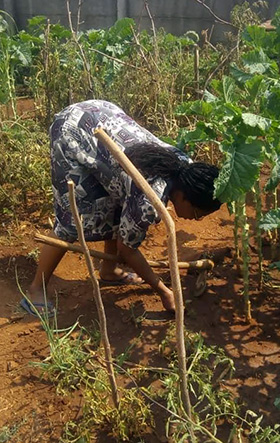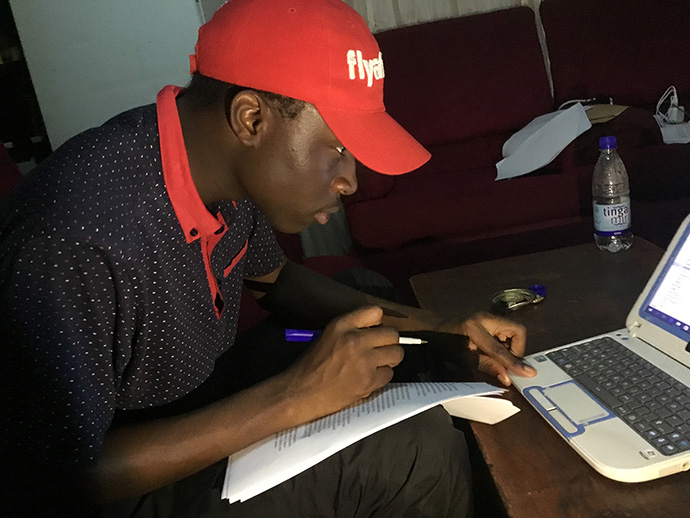More than seven months after the first case of COVID-19 was reported in Zimbabwe, United Methodist leaders are reflecting on the emotional toll of the pandemic.
Nesbert Mhembere, a counselor and evangelism chairperson of Eastview United Methodist Church, said the dangers of the virus, subsequent lockdowns and the country’s economic turmoil have distressed and traumatized families.
“In the homes, we are faced with people who are emotionally drained due to the effects of COVID-19,” he said.
Mhembere noted that many workplaces have closed, making it difficult for some families to afford food and other basic household items.
Many United Methodists, including pastors, also have had relatives affected by the virus, with some losing family members and facing restrictions at their funerals.
“This results in stress and depression,” said Mhembere, adding that church leaders need to provide hope and spiritual direction. “You feel the burden.”

The Rev. Annie Zvingowaniseyi, Harare Innercity United Methodist Church associate pastor, said she has seen firsthand the impact of the virus on families.
“The sense of unhappiness and hopelessness was the hardest experience faced during the two funerals of my church members who were affected by the COVID-19 crisis, challenging people’s faith and beliefs.
“Bodies were taken from the funeral parlor straight to the graveyard, not the church norm — no body viewing, no gathering at the family house. It was very traumatic. People faced stigma. (They were) depressed and pained,” she said.
Zvingowaniseyi said people need to hear the voice of their pastor during challenging times.
“I had to use social media to help me do my pastoral duties by sending audio prayers, sermons and counseling, giving them hope in Jesus Christ,” she said.
The Rev. John Makaniko, pastor-in-charge at Hatfield United Methodist Church circuit, said self-care is of utmost importance for clergy.
“It keeps the pastor in shape in all facets in order to keep doing ministry effectively,” he said.
Zvingowaniseyi said gardening and mediation has helped her cope with the pandemic.
To help lift her spirits, the Rev. Rueben Chanakira, Borrowdale United Methodist Church circuit pastor in the Harare West District, is listening to other people’s sermon messages, holding Bible study with her family and doing self-help projects.
Grace Mutenda, 62, a member of Lukhanyiso United Methodist Church circuit, said the COVID-19 crisis calls to mind stressful times from the past.
“Decades ago, I used to wonder why our grandmother used to talk alone, swear alone, laugh alone and at times (be) too serious alone trying to solve life situations. This year, 2020, this COVID-19 has brought back these memories,” she said. “Nothing is enjoyable. Fears, limitations and confusion are the order of the day.”
The Rev. Solomon Mawoyo, the Zimbabwe West Conference’s education secretary, said the pandemic also has been especially hard on teachers and heads of schools.
“Nobody knew that it was going to take such a long time, and now nobody knows when and how this will come to an end. Schools have run short of money … Some teachers were doing extra teaching lessons, some cross-border trading, and all this is gone,” Mawoyo said.
Sydney Mapisaunga, acting head at Murewa United Methodist Mission School, said the lack of resources and delays in fees being paid are taking their toll. When schools opened on Sept. 28, many teachers feared contracting the virus without the needed protective gear.
“The morale of teachers is very low,” she said.
Students are facing the same anxieties as classes resume.

Eighteen-year-old Tatenda Kambarami studies at his home in Zimbabwe during the COVID-19 lockdown. The pandemic has left many young people struggling to meet exam requirements and worried about their futures. Photo by Chenayi Kumuterera, UM News.
“I have fears and uncertainty of the pandemic’s impact on my academic future,” said 18-year-old Tatenda Kambarami, an examination candidate for advanced level at a local suburban school in Harare.
Tapiwa Dzuda, 28, a member of Warren Park United Methodist Church circuit in the Harare Central District and founder and director of the Brother’s Keeper, a leadership training organization, said it is important to encourage students to realize their potential, even during difficult times.
“Regardless of the challenges faced during the year, our God is greater than all that, and young people can rest on the assurance that the light of Jesus can turn all of the darkest fears into a bright and blessed future,” he said.
Kumuterera is a communicator with the Zimbabwe West Conference.
News media contact: Vicki Brown at (615) 742-5470 or newsdesk@umcom.org. To read more United Methodist news, subscribe to the free Daily or Weekly Digests.
Like what you're reading? Support the ministry of UM News! Your support ensures the latest denominational news, dynamic stories and informative articles will continue to connect our global community. Make a tax-deductible donation at ResourceUMC.org/GiveUMCom.




